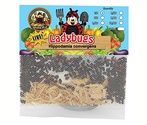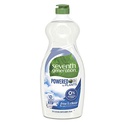Yuck -- nothing is worse than heading out to your garden to grab some veggies for dinner and finding that they've been devastated by some unseen plague. What on earth?!?
There's a good change that you've been stricken by aphids: nearly invisible little creatures that can plow quickly through a garden full of veggies and leave you without much left in terms of your garden. They love to eat, and they eat everything from fruit, flowers, roots, stems, buds, leaves and even plant juices -- basically, everything they can find! Aphids particularly love sweet new buds and vegetation, which can cause stunted growth in your garden. Learn more about these pests and a homemade aphid treatment that will leave you feeling good about eating the fruits of your labor without worrying about you or your loved ones ingesting dangerous chemicals.
All About Aphids
Aphids are small, soft-bodied little insects that multiply at a frightening rate, which means you could have several generations of aphids in your home within a single season. The little pests will make you want to spend hours searching for ways to get rid of aphids, but the natural resolution is surprisingly easy. There are many types of aphids, generally named by the type of plant they prefer to attack: green peach aphids, wooly apple aphids, rose aphids, cabbage aphids and potato aphids to name a few. Aphids are so small that they are nearly invisible to the human eye -- at less than 1/4 inch long as adults, they can create an outsized problem in your garden. Their pear-shaped bodies and cornicles (short projectiles on their hind end) are how you can differentiate these nasty little beasties.
Believe it or not, a single aphid could spawn as many as 5 billion aphids each year!
This truly shocking rate of reproduction means that your problem could become worse very quickly. Females may have up to 100 offspring and her reproductive system goes into overdrive in the spring -- with as many as 40 different generations of young aphids each year. These little mites are also called "plant lice", because they suck up all the good stuff from your veggies and can leave you with blackened, shriveled plants if you're not careful.
Signs That You Have Aphids
Do you have these little critters in your garden? Since they're so tiny and hard to see, here are some tips of determining whether you have aphids or some other problem.
- You see a sticky, sugary liquid on leaves or stems. This is actually the waste left behind after they eat -- Eww!
- Leaves that are yellow, curled up or misshapen
- You see small, colored moving spots on your plants (you guessed it -- aphids!)
Now that you know what aphids look like and how to spot them on your plants, here are tips for creating your own homemade aphid spray.
Aphid Treatment: Homemade Aphid Spray
{{ amazon }}The good news is that although aphids are a serious pest problem for your veggies, they are relatively easy to kill -- and natural methods work quite effectively. Killing aphids with soapy water is quite easy to do, and will not harm your plants at all. While some farmers leave behind a small number of aphids to feed beneficial bugs such as ladybugs, others look for ways to completely eradicate the pests. Simple water or a slightly soapy solution will wash the little buggers down to the dirt, where they will not survive for long. {{ amazon }}
If you are looking for a quick and easy commericial solution, they do sell organic pre-mixed solutions. These make it a bit easier for those that don't want to make their own homemade solution. {{ amazon }}
One other way to remove aphids is with ladybugs! That's right, those cute red and black bugs love to eat aphids. And the best part is they leave your plants alone. There are bags of live ladybugs you can buy that when released on your plants will eat up the aphids, mate, and then fly away. When their babies hatch, they will also come around eating any aphids that might have been missed.
No matter how you slice it, aphids can wreak some serious havoc in your garden. The best option is to safely wash them off and get them out to he way -- or release a lot of ladybugs to eat them up!






